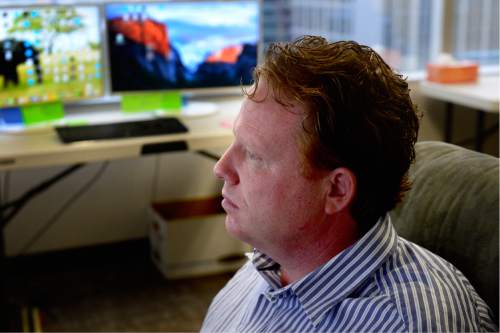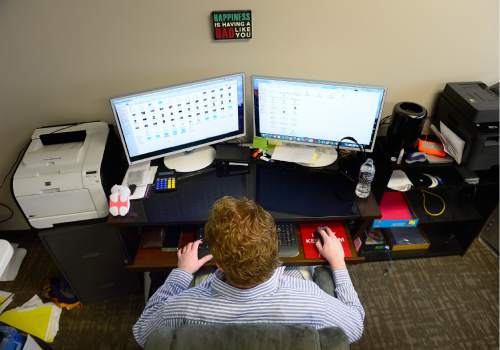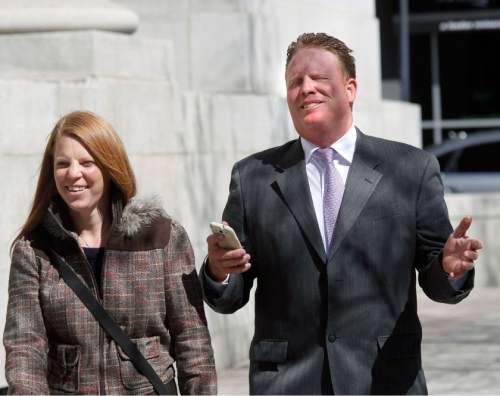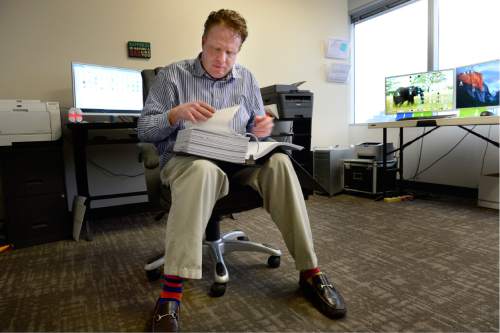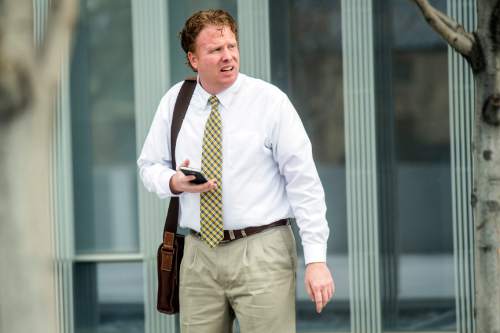This is an archived article that was published on sltrib.com in 2016, and information in the article may be outdated. It is provided only for personal research purposes and may not be reprinted.
Tensions rose in the courtroom Tuesday during testimony of a government witness who seemed to undercut some of the prosecution's case against St. George businessman Jeremy Johnson — and then was led into an area of inquiry forbidden by the judge.
U.S. District Judge David Nuffer threatened to hold defense attorney Marcus Mumford in criminal contempt and fine him $500, saying Mumford's cross-examining of the former attorney for Johnson's online marketing company I Works violated court orders that restricted the defenses available to Johnson and two top employees. The three defendants are in their third week of a trial in federal court in Salt Lake City. They face 86 charges related to allegations that they defrauded Wells Fargo Bank by setting up dozens of companies using the names of employees, family and friends to process credit cards after a large number of consumer chargebacks led to cancellation of some of I Works' bank accounts.
The tensions broke into open court when Mumford pressed a witness, former I Works in-house attorney Phillip Gubler, over a 2009 email exchange with Johnson in which the attorney warned that laws were being broken by I Works as it set up numerous companies using names and information from various people in order to obtain new credit card processing accounts.
Gubler, in his first legal job out of law school, warned in an email to Johnson that their actions were a violation of federal law "if the financial institution has not authorized such transactions. Credit-card laundering is the misuse of a merchant account with a financial institution."
I Works, he wrote, "needs to stay away from setting these types of entities up."
But under cross-examination from defendant Ryan Riddle, who is acting as his own attorney, Gubler said that after his warning email, Johnson showed him an email from a credit card processor that Gubler said demonstrated that banks and processors were aware of the slew of companies being set up to process credit cards, and that they were OK with it.
After seeing that email, Gubler said, "It was my understanding the banks did know and the processors knew what was being done."
Mumford, who represents former I Work accountant Scott Leavitt, picked up the line of questioning about the email, which Gubler said "made it clear … that the processor [not only] knew what was going on, but actually gave the instructions on setting them up."
Then Mumford asked about an email from Johnson replying to Gubler's concerns: "I am glad you brought this to my attention because we want to breakdown processing by affiliate so one bad affiliate does not bring down the whole system."
The use of the word "affiliate" is a reference to outside companies that were contracted to sell I Works products while I Works shepherded the credit cards through its systems. Johnson has contended that the affiliates were defrauding I Works and causing the chargeback problems, and that the new companies were a response to them and an attempt to root out fraud by putting each affiliate into a separate processing account.
Nuffer, however, had previously ruled that the defense of affiliate fraud causing I Works' problems could not be used at trial under the federal rules of evidence because it could cause confusion and mislead the jury.
When Mumford started to press the issue of affiliate fraud with Gubler, Assistant U.S. Attorney Karin Fojtik objected, citing the court's ruling. Nuffer sustained the objection and told Mumford he had deliberately violated the order and would be dealt with. When Mumford started to say something, Nuffer snapped, "Don't argue with me on that."
At the lunch break with the jury out of the courtroom, Nuffer said he intended to hold Mumford in contempt and fine him $500. In response, Mumford said Nuffer had allowed the government to introduce evidence that raised the issue of affiliate fraud.
"When the court accepted into evidence materials and evidence that raised these issues, I have to be able to examine a witness about those matters," Mumford said.
The attorney also struck back at the judge's rulings in the case, saying: "In fact I've never been in a case where I've got this far in a case and not been able to discern the basis he's making some of his rulings on."
Nuffer backed off and declined to impose the fine or the contempt finding, but he also shot back at Mumford that he was puzzled by how some of Mumford's lines of questioning were relevant to the trial.
Nuffer's courtroom demeanor during the trial has been an issue for the defense.
Riddle raised the subject again on Tuesday, telling Nuffer he was treating the defense like naughty children by telling them "don't open your mouth again," while the prosecution isn't treated the same.
"I just want things equal across the board," Riddle said.
Prosecutors from the U.S. attorney's office have presented witness after witness who have testified that they had not signed documents or sometimes were not even aware that companies had been set up in their names and used to apply for credit card processing accounts. But the defendants have hammered away using emails and other evidence to try to show that the witnesses — most of them former I Works employees — had given permission to form the companies in their names, and some had allowed others to sign documents for them.


